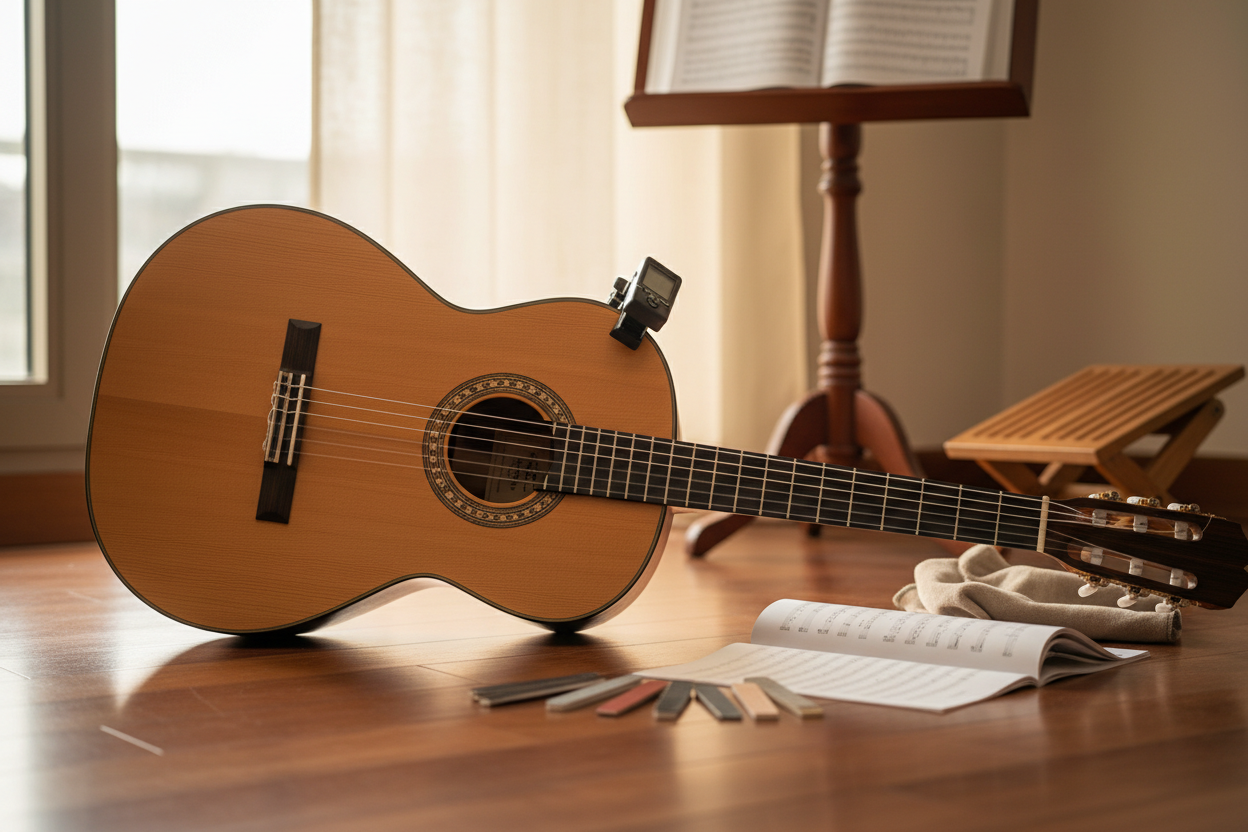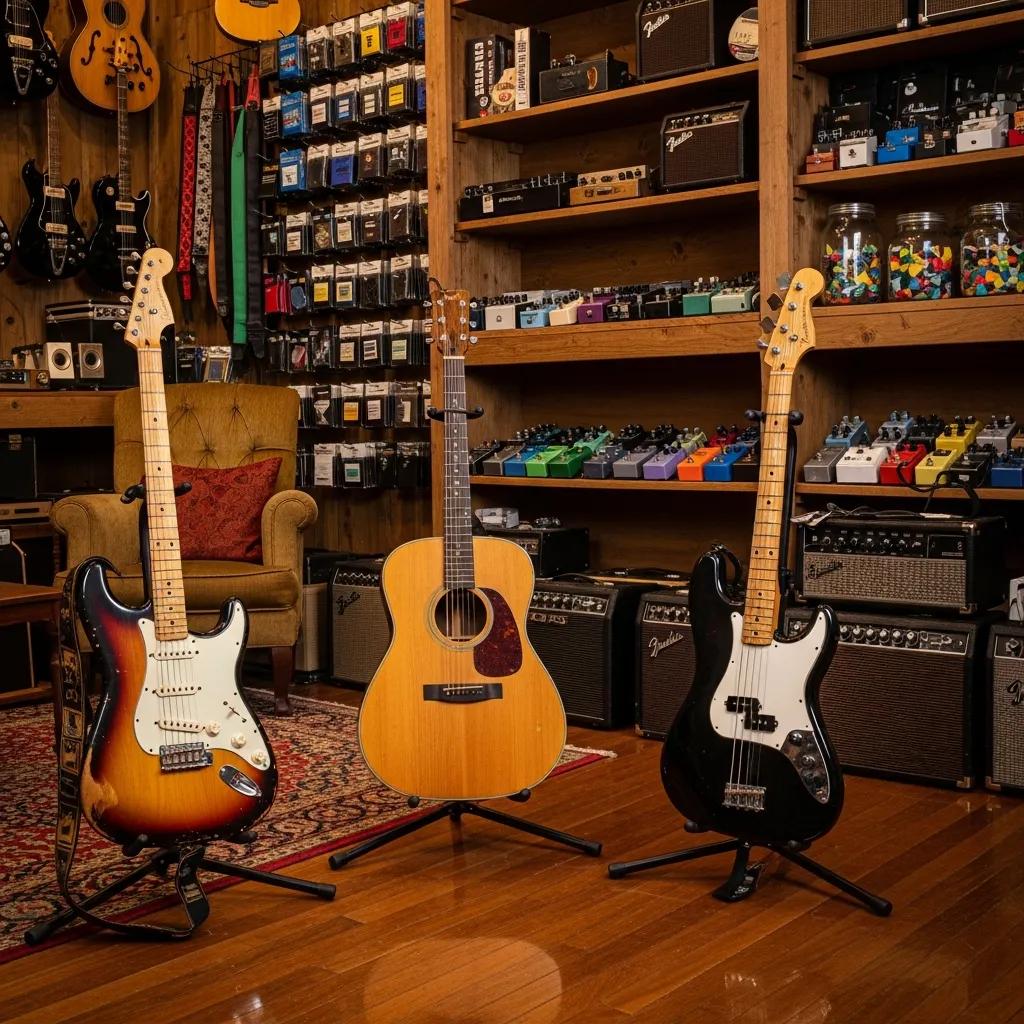What is a Guitar String Gauge?
A guitar string gauge is simply how thick or thin the strings are, measured very precisely. Typically, electric guitar strings are made of steel, nickel, or a combination of both. The thickness of the strings is measured in thousandths of an inch, and the most common gauges range from .008 to .013 for the top E string (thinnest). This thickness matters because it affects how easy it is to play the guitar and the sound it makes. Lighter strings are easier to press and bend, perfect for quick playing or if you're just starting out. Heavier strings need a bit more effort to play but give you a richer sound, which is great for playing powerful rhythms or if you're after a deeper tone.
Importance of Guitar String Gauge
The thickness of your guitar strings, or guitar string gauge, plays an important role in shaping your playing experience and the music you create. Whether you're playing an acoustic guitar, tuning on an electric guitar, or using bass guitars, choosing the right gauge is important.
- Playability: Lighter gauges like 9 gauge strings or 10 gauge strings are easier on your fingers, making them a top pick for beginners or players into fast, intricate solos. They're like the electric guitar for beginners because they require less pressure to press down, allowing for smoother and quicker learning.
- Tone Quality: The thickness of your strings can change the sound of your guitar. Thinner strings, often found on electric guitars, provide a bright, sharp sound ideal for lead guitarists. Thicker strings, such as 11 gauge strings or 12 gauge guitar strings, give you a fuller, warmer tone, perfect for an acoustic guitar or rhythm playing.
- Durability: Heavier strings, like those used on bass guitars, are more durable and can handle aggressive playing styles. If you're into rock or metal, a heavier gauge can withstand the rigors of hard strumming and bending.
- Tuning Stability: Thicker strings hold their tuning better, making them a solid choice for performers or anyone who doesn’t want to tune their guitar frequently. For example, medium gauge electric guitar strings offer a balance between playability and maintaining tuning.
- Style Compatibility: Depending on your musical style, certain string gauges are more appropriate. Light gauge acoustic guitar strings are fantastic for folk or country, while heavier strings might be chosen for genres that demand a bigger sound, like blues or jazz.
Factors to Consider When Choosing Guitar String Gauge

- Playability vs. Tone: Lighter gauges like 9 gauge strings are easier on the fingers, making them great for beginners and fast playing styles. However, they might lack the fuller tone of heavier gauges, such as 11 gauge strings, which provide richer sound but require more finger strength.
-
Guitar Type: The type of guitar you have also matters. Acoustic guitars may benefit from light to medium gauges, enhancing their natural sound without too much stress on the instrument. Electric guitars are more versatile, accommodating everything from light gauge acoustic guitar strings to heavy gauge guitar strings, depending on whether you're after speed or a solid, beefy tone.
-
Playing Style: If you're into fast solos or lead playing, lighter strings (9 gauge electric guitar strings) might be your best bet. Rhythm players or those who prefer a more robust sound might lean towards 10 gauge guitar strings or even heavier.
-
Instrument Care: Consider guitar care when choosing your strings. Heavier strings can put more tension on your guitar, potentially requiring adjustments to your strap buttons, guitar stands, or even the truss rod. Ensure your instrument can handle the gauge you're considering.
-
Your Skill Level: Thinner strings may be easier to play and less fatiguing if you are a beginner or have weaker hand strength. However, if you are an advanced player with strong hands, thicker strings may provide more tonal options and greater sustain.
-
Experimentation: There's no one-size-fits-all. Try out different gauges to see what feels and sounds best for you. Second-hand guitars can be a great way to experiment with different string gauges without investing too much upfront.
How Guitar String Size is Measured
Guitar string size, or gauge, measures how thick the strings are. This thickness affects how your guitar sounds and feels when you play it.

- Units of Measurement: Guitar string gauges are measured in inches, specifically in thousandths of an inch. So, when you hear someone talk about a 10 gauge string, they mean the string is 0.010 inches thick.
- Gauge Numbers: The gauge number tells you how thick the string is. Lower numbers like 9 gauge are thinner strings, making them easier to press and bend. Higher numbers like 12 gauge represent thicker strings, which produce a fuller sound but might be harder on your fingers.
- Types of Strings: There are various types of strings, such as those for electric guitars, acoustic guitars, and bass guitars. Each type can have different gauge ranges suited for specific sounds and playing styles. For instance, light gauge acoustic guitar strings are great for beginners, while heavy gauge guitar strings might be preferred by jazz or blues players for their richer tone.
Different types of Guitar String Gauges Sizes
Guitar strings come in various thicknesses, known as gauges, each offering distinct benefits and challenges to players. From the delicate touch required for extra-light strings to the finger strength needed for heavy gauges, understanding these differences is important for every guitarist, whether you're picking up the instrument for the first time or looking to refine your sound.
- Extra-light Gauge: Ideal for acoustic guitars, typically ranging from .010 to .047. For electric guitars, this means gauges as thin as .009 or .008, offering ease of play but a higher breakage risk.
- Light Gauge: For acoustic guitars, gauges from .012 to .053, and for electric guitars, .010 to .046, balancing durability with a pleasing tone.
- Medium Gauge: Starts at .013 for acoustic and .011 for electric guitars, favored in blues and rock for substantial tone and flexibility.
- Heavy Gauge: Begins at .014 for acoustic and .012 for electric guitars, best for jazz's bass-forward tone and requiring more finger strength.
|
Gauge Type |
Description |
Typical Uses |
Pros |
Cons |
|
Extra Light (.009 -.008) |
Electric guitar strings with the thinnest gauge, offering ease of play. |
Ideal for beginners, lead guitarists, and those who prefer bending notes with ease. |
Easier to play and bend notes. Less finger fatigue. |
Less volume and sustain. More prone to breakage. |
|
Light (.012-.053) |
A balanced choice for electric guitars and acoustic guitars, providing a nice middle ground. |
Versatile for various music styles, from pop to rock. |
Good balance between playability and tone. |
Might lack the volume and depth of heavier gauges. |
|
Medium (.013-.056) |
Acoustic guitar strings and electric guitar sets that offer richer tones. |
Suited for rhythm guitarists and those seeking more volume and sustain. |
Richer sound with more volume. |
Harder on the fingers. More challenging bends. |
|
Heavy (.014-.059) |
Thick guitar strings designed for acoustic and some electric guitars, providing maximum volume and sustain. |
Preferred for blues, jazz, and genres that benefit from a fuller sound. |
Maximum volume and sustain. Richer tones. |
Requires more finger strength. Can be tough on the guitar's neck over time. |
How Can You Know What Gauge Your Strings Are?

Ever wondered "how do i know what gauge my guitar strings are
" Well, you're not alone! Knowing the gauge of your guitar strings is crucial, especially when you're aiming to replace them or tweak your sound. Whether it's an acoustic guitar, an electric guitar, or a bass guitar, each has its own set of strings with different thicknesses. Here's how you can easily find out what you've got:
- Check the Packaging: The simplest way to know your string gauge is to check the packaging they came in. Most guitar strings come with the gauge clearly labeled, like "10 gauge guitar strings" for a set that's on the lighter side or "12 gauge guitar strings" for something a bit thicker.
- Use a String Gauge Tool: If you've lost the packaging or got the guitar second-hand, don't fret! You can use a string gauge tool or string action gauge. These handy devices can measure the thickness of your strings in inches or millimeters, letting you know exactly what you're working with.
- Look for Markings: Some guitar string manufacturers print the gauge directly on the ball end of the string. Take a peek near where the strings anchor to the bridge or the tailpiece of your guitar. You might just find the numbers you're looking for.
- Digital Calipers: For the tech-savvy guitarist, digital calipers can be used to measure the thickness of each string. Just clamp the calipers around your string, and voilà, you'll have a precise measurement.
- Consult the Manufacturer's Website: If you know the brand of your guitar or the strings, their website might list the default string gauges. Brands like Martin Guitars, PRS Guitars, or Rickenbacker often provide this information for their models.
- Ask at a Music Store: When in doubt, take your guitar to a local music store. Experts there can often tell the gauge of your strings just by feeling them or can measure them for you. It's also a great chance to explore guitar accessories like new guitar picks, guitar stands, guitar slides, etc.
Most Popular Guitar Strings Available
Picking the right strings for your guitar can feel difficult. But, fear not! Whether you're jamming on an electric guitar, playing an acoustic guitar, or laying down the groove on bass guitars, some strings just stand out from the crowd. Let's dive into some of the most popular guitar strings that musicians around the world swear by

Ernie Ball Regular Slinky Electric Guitar Strings:
Ernie Ball Regular Slinky Electric Guitar Strings is A go-to for electric guitar enthusiasts, these strings are loved for their balanced tone. They're perfect for various genres, making them a top choice for beginners and pros alike.
Elixir Strings 80/20 Bronze Acoustic Guitar Strings with NANOWEB Coating:
Elixir Strings 80/20 Bronze Acoustic Guitar Strings is Known for their long-lasting tone, these strings are a favorite among acoustic guitar players. The NANOWEB Coating keeps them feeling fresh and reduces finger squeak.
D'Addario EXL170 Nickel Wound Bass Guitar Strings:
D'Addario EXL170 Nickel Wound Bass Guitar Strings are a top choice among bassists who value bright tone and precise intonation. Known for their versatility, these strings perform exceptionally well across a wide range of genres from jazz and funk to rock and pop. Whether you're playing a 4-string or 5-string bass, the EXL170 set delivers consistent quality, making it ideal for players of all skill levels. Trusted by professionals and hobbyists alike, these nickel wound strings provide a balanced feel and long-lasting performance.
GHS Boomers:
Popular among both electric and bass guitar players, GHS Boomers are known for their durability and rich tone. They're a great choice if you're looking for strings that can handle heavy playing.
Martin SP Flexible Core 92/8 Phosphor Bronze acoustic:
The Martin SP Flexible Core 92/8 Phosphor Bronze acoustic strings are crafted with the same legendary quality that has made Martin Guitars a trusted name for generations. Designed specifically for acoustic guitars, these strings deliver a warm, rich tone with enhanced playability. The flexible core makes them easier on the fingers while still producing the full, resonant sound Martin is known for. Whether you're strumming or fingerpicking, these strings offer superb tonal clarity and durability, making them a favorite among acoustic players.
PRS Signature Strings:
Tailored for PRS guitars like the PRS McCarty or the PRS Silver Sky, these strings are engineered to maximize performance, comfort, and tone.
Fender Super Bullets:
Fender Super Bullets are the perfect match for Fender electric guitars, delivering a bright, punchy tone with outstanding sustain. Engineered for rock and blues players, these strings are known for their durability and precise performance. The unique bullet-end design ensures a secure fit in tremolo blocks, enhancing tuning stability and string life. Whether you're playing live or recording, Fender Super Bullets offer the reliable tone and performance that serious guitarists demand.
Rotosound UM10 Electric Strings 10-46 :
The Rotosound UM10 Electric Guitar Strings with a size of 10-46 are perfect for anyone who wants to play music like the famous rock bands from Britain. These strings make your guitar sound really clear and bright, and they let the notes last a long time. They're a popular choice for guitar players who love rock music.
Choosing String Gauges for Different Guitars
Selecting the right string gauge is like picking the perfect outfit it has to match the occasion and feel right! And when it comes to guitars, the "occasion" is the type of guitar you're playing. Whether you're a budding musician or a seasoned performer, Music Street is here to guide you through choosing the perfect string gauges for different types of guitars. Let's break it down

- Acoustic Guitars: For the soulful strummers and fingerpickers, light gauge acoustic guitar strings are a great starting point. They're easier on the fingers and perfect for those delicate tones. Music Street often recommends going for something like 12 gauge guitar strings if you're just starting or prefer a softer touch.
- Electric Guitars: If you're all about those electric riffs and solos, string gauge can really influence your playability and tone. 9 gauge guitar strings are popular for their flexibility and ease of bending, ideal for genres like rock and blues. Players of Les Paul guitars or PRS guitars, like the PRS SE McCarty 594, might lean towards 10 gauge strings for a bit more resistance and fuller sound.
- Bass Guitars: The backbone of any band's sound, bass guitars require strings that can deliver depth and clarity. Bass guitar string gauges typically start around .040 for the lightest string and can go up to .130 for the heaviest. For most styles, a medium gauge set like 45-105 offers a good balance between playability and tone.
- Archtop and Jazz Guitars: Jazz enthusiasts and archtop guitar players might prefer heavy gauge guitar strings for that warm, rich sound. 11 gauge strings or even 12 gauge strings can provide the volume and tone control that jazz players love.
- Specialty Guitars (like 7-string or 12-string guitars): These unique instruments require specific string sets. For instance, a 7-string guitar might need a specialized set that includes a heavier gauge for the additional lower string, ensuring balanced tension across all strings.
At Music Street, we understand that every guitarist has unique needs and preferences. That's why we offer a wide range of guitar accessories, from guitar picks and guitar stands to guitar cables and Hiscox cases. Our experts are always here to help you choose the best guitar strings and accessories for your playing style and instrument.
Why Choose Music Street?
Choosing Music Street for your guitar needs means you're not just buying strings; you're getting a partner in your musical journey. At Music Street, we pride ourselves on offering a curated selection of guitar strings tailored to every player, from beginners to seasoned professionals. Our expertise lies in guiding you to the perfect string gauge that complements your playing style, ensuring your guitar delivers its best sound. Whether you prefer the gentle touch of light gauge strings or the full-bodied resonance of heavier ones, Music Street is dedicated to enhancing your playing experience. With us, you're not just making music; you're elevating it.
Frequently Asked Questions
Do thicker guitar strings sound better?
Yes, thicker guitar strings, often referred to as heavy gauge strings, typically produce a better sound for many guitarists, especially those looking for a fuller, more resonant tone. Thicker strings can enhance the overall volume, sustain, and richness of the sound.
Are 13 gauge strings hard to play?
13 gauge strings are considered heavy and can be harder to press down and bend compared to lighter gauges. They're often used for acoustic guitars and might require more finger strength, which can be challenging for beginner .
What gauge is best for acoustic guitars?
Light to medium gauges (12 gauge strings or 11 gauge strings) are generally best for acoustic guitars. They offer a nice balance between playability and a rich, full tone, making them versatile for various playing styles.
Can heavy gauge strings damage a guitar?
Yes, over time, heavy gauge strings can exert more tension on the guitar's neck, bridge, and top, potentially leading to damage. It's important to adjust your guitar's truss rod and ensure it's properly set up for heavier strings to avoid any issues.
Does guitar string gauge matter?
Yes! The gauge of your strings affects playability, tone, and the overall feel of your guitar. Lighter strings are easier to play and bend, while heavier strings offer more volume and sustain. Choosing the right gauge is crucial for your comfort and the sound you want to achieve.
How do guitar string gauges work?
Guitar string gauges refer to the thickness of the strings, measured in thousandths of an inch. The thicker the string (higher gauge number), the heavier it is. Heavier strings require more tension to reach the correct pitch, affecting the sound and feel of your guitar.
What gauge is the B string on a guitar?
On a standard set of light gauge electric guitar strings, the B string is typically .011 inch. For acoustic guitars, it might be slightly thicker, around .012 inch.
What gauge is the D string on a guitar?
The D string gauge varies by set, but for light gauge electric strings, it's usually around .024 inch, and for acoustic strings, it might be .026 inch.
What gauge is the G string on a guitar?
For electric guitars with light strings, the G string is often .016 inch. In acoustic sets, it's thicker, around .022 inch.
OUR MOST POPULAR SEARCHES :
Guitar Strap | Yamaha Revstar | PRS Custom 24 | PRS Guitars | Les Paul Guitars | Guitar Amp | Martin Guitars | Fender Acoustic Guitar | Electric Guitar For Beginners | Guitar Accessories | Electric Guitar | Bass Guitar | Acoustic Guitar | Guitar Strings | PRS Silver Sky | PRS McCarty 594 | Maton Guitars | PRS Tremonti | Patrick James Eggle Guitars | PRS Hollowbody ii Piezo





Share:
5 Factors to Consider When Buying a Fender Stratocaster
7 Reasons Why Every Guitar Player Needs a Matchless Amplifier